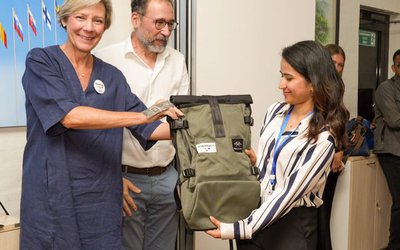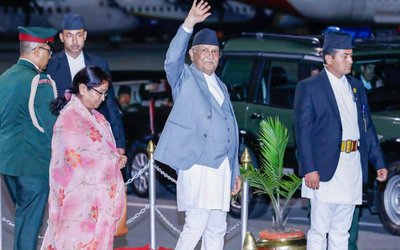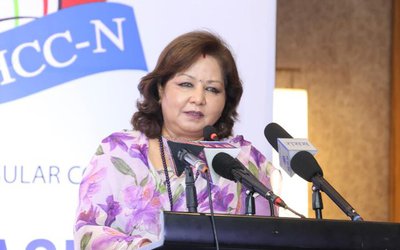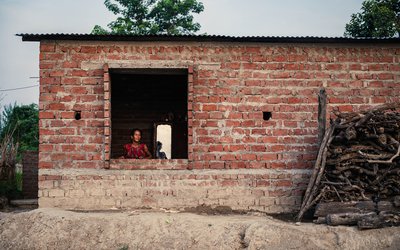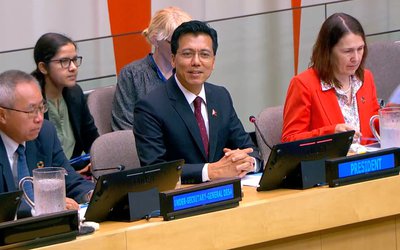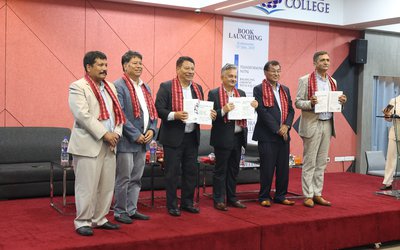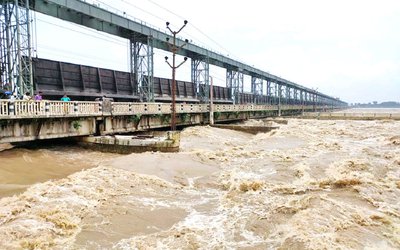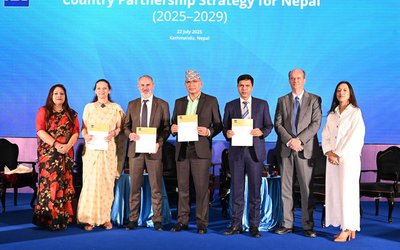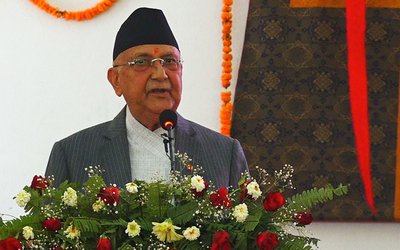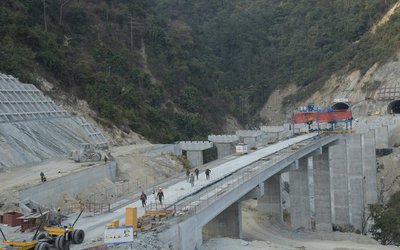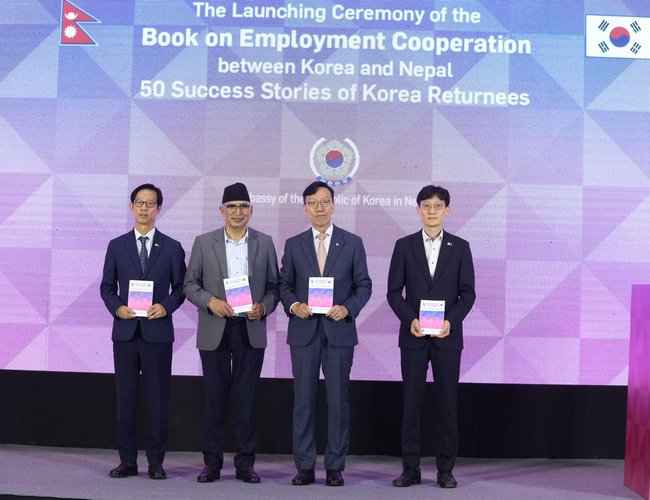
Suresh Bahadur Chhetri, a 37-year-old resident of Bareng Rural Municipality in Baglung district of Gandaki Province, had aspirations of becoming an entrepreneur. His eight-year stint as a migrant worker in South Korea proved to be instrumental in achieving this goal upon his return home.
Chhetri was selected under the EPS program in 2011 and spent seven years working in Korea before deciding to establish a tourism-based agriculture venture in his hometown. Shortly after coming back from Korea, he launched an organic agro-tourism business by opening a restaurant in Butwal that showcased local products. Despite facing challenges due to the COVID-19 pandemic, Chhetri remained determined to pursue his entrepreneurial dreams.
Today, his restaurant offers a variety of cuisines made from locally sourced ingredients, with one of the standout dishes being meat from domesticated kalig pheasants. Chhetri emphasized that his experience in Korea not only helped him earn money but also equipped him with the skills and knowledge needed to run a successful business.
Similarly, Dharmaraj Joshi, a resident of Dhangadhi in Sudurpaschim Province, spent a decade working in Korea after being selected through the EPS program. His time in Korea enabled him to acquire the resources and expertise to establish his own business back home, creating job opportunities for others.
Joshi has made significant contributions to his community in Sudurpaschim by setting up a cooperative and operating a hardware store in Dhangadhi that features local products. Both Chhetri and Joshi exemplify how the EPS program not only provides employment opportunities but also fosters the development of human resources for individuals seeking to pursue entrepreneurial endeavors.
Over half a million people have returned home after working in foreign countries, but hundreds of people have gone missing. However, many individuals like Chhetri and Joshi, who returned from Korea, are making significant contributions to the national economy by utilizing their skills within the country.
Authored by Shva Prasad Pokharel, a recently published book featuring the stories of 50 Nepali migrant workers who returned from Korea highlights the role of foreign employment in the country's prosperity and economic development.
Despite the large number of Nepalese engaged in foreign employment, there are only a few books that document and share the experiences of returning migrants and their contributions.
The publication of this book and the sharing of success stories by the Embassy of the Republic of Korea in Nepal have been instrumental in inspiring other returning migrants.
Among the millions of returning migrants, those who came back from Korea have shown how to succeed in Nepal by applying the skills they acquired abroad.
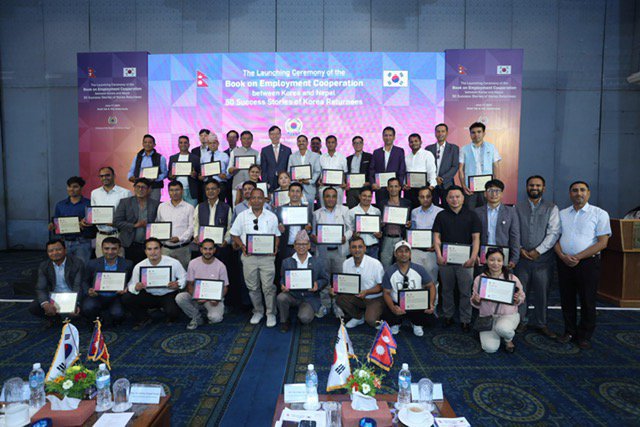
Deputy Prime Minister and Finance Minister Bishnu Prasad Poudel, along with Ambassador of the Republic of Korea to Nepal Park Tae-young, endorsed the contributions of returning migrant workers by launching the book titled "You can be the Boss’ Tapai Pani Malik Banna Saknuhuncha."
The book showcases success stories of Nepali returnees from South Korea, highlighting their achievements in various sectors such as manufacturing, agriculture, services, and education. These stories demonstrate the positive impact of their work in Korea through the Employment Permit System (EPS).
The book launch event, attended by media personnel and successful returnees, aimed to inspire Nepali youth to explore economic opportunities and make a cultural impact.
Organized by the Embassy of the Republic of Korea in Kathmandu, this is the second book featuring successful stories of returnee migrant workers from Korea.
During the event, Deputy Prime Minister and Finance Minister Bishnu Paudel stressed the importance of encouraging Nepali youth to seek opportunities within the country. He emphasized that Nepal has great potential but currently lacks individuals willing to build their future there.
Finance Minister Paudel highlighted Nepal's vast potential and emphasized the importance of utilizing its resources for prosperity. He also stressed the significance of using skills and capital acquired abroad to accelerate the country's development.
He acknowledged the abundant natural beauty, culture, history, and archaeology of Nepal, emphasizing the importance of utilizing domestic resources for the country's future. Minister Paudel recognized the interconnected nature of the modern world, where people often cross borders for education, work, or business opportunities.
Minister Paudel encouraged Nepalese youth to leverage the skills and knowledge they acquired in Korea for the betterment of Nepal, expressing optimism that their contributions would propel the nation towards prosperity. He also noted that their experiences could serve as inspiration for others to return home and contribute to Nepal's development.
Ambassador Park Tae-young of the Republic of Korea praised the positive impact of the EPS program, which has facilitated over 100,000 Nepalese workers to work in Korea under fair conditions since 2007. He stressed that the program has provided valuable opportunities for Nepalese youth to secure employment, return with dignity, and uplift their communities, highlighting that the EPS program is more than just a labor initiative—it is a partnership for human development.
He expressed pride in unveiling the second edition of this publication, which now features 50 success stories, nearly double the number from last year's collection of 26, all authored by Mr. Shiva Prasad Pokharel. These returning migrant workers have emerged as catalysts for progress in Nepal through their commitment, diligence, and aspirations.
This book is more than just a collection of individual experiences; it stands as a testament to the transformative impact of bilateral employment cooperation between Korea and Nepal under the Employment Permit System (EPS)," Ambassador P Park Tae-young emphasized.
Kong Moo Heon, the Country Director of KOICA and a special guest at the event, expressed, "I am honored to represent KOICA at the launch of this new book."
The stories shared by the two Korean returnee migrants who have successfully established industries in Nepal and the influence of Korean learning on their endeavors are highly relevant to policymakers currently working on reintegrating returnee migrant workers.
As Ambassador Park rightly noted, "Each individual featured in this book embarked on their journey with courage, leaving their homes to work in Korea, where they not only earned income but also gained skills, discipline, and a vision for their future. Upon returning to Nepal, they invested their earnings, both financially and experientially, in creating businesses, generating local employment, and contributing to their communities. They are now part of a positive cycle of migration, reintegration, and national development."
"These 50 entrepreneurs exemplify what can be accomplished when opportunity meets ambition. They are not just success stories; they are role models, and their experiences illustrate that well-managed and mutually respectful temporary labor migration can bring sustainable benefits to both countries."
Ambassador Park also handed out letters of appreciation to the Korean returnee migrants at the event. These 50 entrepreneurs showcase the potential that arises when opportunity meets ambition. They are not just success stories, but also role models, demonstrating that well-managed and mutually respectful temporary labor migration can bring sustainable benefits to both countries.
This accomplishment is a reflection of the enduring friendship between our two nations. Over the past two decades, Korea and Nepal have collaborated closely within the EPS framework. Since 2007, more than 100,000 Nepalese migrant workers have worked in Korea under the EPS program on equal footing with Koreans. This initiative has provided valuable opportunities for Nepalese youth to secure employment, return with dignity, and uplift their communities back home. The EPS is more than just a labor program—it is a partnership for human development.
To further enhance this partnership, the Korean government, through KOICA, has been implementing the "K-Hami" project, which offers support for reintegration at various stages from pre-departure to post-return. This support includes entrepreneurship training, business development guidance, and access to resources and tools to empower returning workers to establish their future in Nepal. The positive feedback we have received so far is truly inspiring.
- EU’S ERASMUS MUNDUS: Scholarship For Quality Education
- Aug 05, 2025
- ADB: Partnership For Growth
- Aug 04, 2025
- HCC-N: Economic Ambassador
- Aug 03, 2025
- MONETARY POLICY: Disappointing Outcome
- Jul 17, 2025
- MELAMCHI WATER SUPPLY: No Interruption During Monsoon
- Jun 25, 2025
